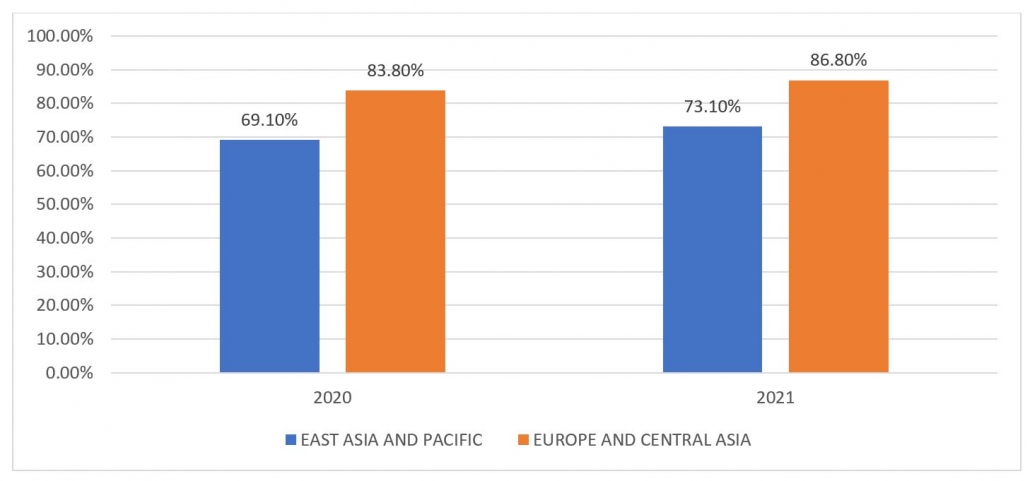Increase in Automation and Adoption of Technology Propels the Self-Service Ticket Machines Market

Self-service ticket machines (TVMs), or automatic ticket vending machines, have become an increasingly convenient method of booking tickets for public transportation, replacing the traditional method of ticket booking through counters. Self-service are machines that allow users to operate to purchase a product or service as per their needs without any reception required. Self-service machines have different varieties, which include Payment terminals, automatic teller machines (ATMs), Vending Machines, Ticket machines, and check-in terminals.
Self-service ticket machines are also known as ticket kiosks, which are used to purchase and dispense different types of tickets, receipts and cards, which is commonly used in places like movie theatres, sports and concert stadiums, museums, zoos, historical landmarks, parking areas, and transportation locations like the railway station, metro, and airports. This helps in reducing wait times, limits face-to-face interactions, and allows better allocation of regular staff for other tasks. For example, The Indian Railway Automatic ticket vending machine is a touchscreen-based ticketing kiosk that is operated using user-specific smart cards, which are similar to identity cards and can be acquired from the Ticket counters. Users then use the card on the ATVM where the user has to specify the starting location and ending location for the ticket to be generated and printed for use.
The main locations in which the self-service ticket machines are implemented are in railways and airports. Ticketing kiosks are commonly used in metro stations and airports for self-check-in, which reduces the amount of passenger queueing and also reduces the cost and time taken to book tickets. The ticketing kiosks provide quick entry and exit of passengers from the counter due to the booking is done through a ticketing kiosk, which can be online or offline. The online form of the ticketing kiosk is through online platforms, like ‘FareHarbor’, that provide the details and requirements about the trip on an online website to purchase a ticket. Whereas an offline form is in the railway or airport establishments, where the machines have been implemented for passengers to use and access information to purchase and dispense tickets.
With the increase in the adoption of automation and technology, It is expected that the self-service ticket machine market will grow at the same pace as the technological advancements that occur in the modern era. The use of robots for the automation of tasks has become commonplace in the modern era, with the implementation of automation into ticket booking. Automation also helps the workers and staff to handle other higher-level tasks and will reduce the costs required for a traditional ticket counter. As per Census.gov, it has been found that the main motivation for the implementation of automation is the improvement of the quality of production processes from 69% to 80% of the workers. This can boost the growth of the ticketing kiosks and is expected to grow at an equal pace with technological advancements.
As of April 2023, a startup company from IIT Kanpur received TBD-DST funding which aided the startup with Rs.4.12 crores for the commercialization of Machine Vision and Robotics Systems in the Manufacturing industry. This solution integrates artificial intelligence and robotics and will be used as a direct substitute for the Quality Assurance and Inspection system, which is used for industrial automation in railways and manufacturing industries. With the integration of AI, the automation systems will provide better performance and results for all sectors.
Another factor that can be a player in the growth of the self-service ticket machine is the increase in travel and tourism. It is expected that the self-service ticket machines market will witness growth in the United Kingdom at a steady rate. Self-service ticket machines provide/ dispense tickets in the form of paper tickets or digital tickets. Digital tickets are much more convenient and eco-friendlier and as internet users increase, the digital form of tickets is more preferred by users and travellers worldwide. As per VisitBritain, it has been forecasted to have 37.5 million visits, which is 91% of the 2019 level. This can boost the growth of the self-service ticket machines.
Another growth driver that can propel the self-service ticket machines is the growing number of users of the internet. As of Q4 2023, it has been estimated that a total of 5.30 billion people around the world use the Internet, which is equivalent to 65.7% of the world’s total population. Since the rise in the internet can increase the number of users who will prefer going digital for booking tickets and self-service, the market will experience a high rate of growth from the increasing population of internet users. As per the World Bank, it was found that there was a significant increase in internet users, from 69.1% to 73.1% of population in the East Asia and Pacific Region and an increase from 83.8% to 86.8% of population in the Europe and Central Asia Region, during 2020 – 2021. North America had the highest number of users in 2020, with 91% of the region’s population being internet users.
Figure 1: Internet Users, East Asia and Pacific & Europe and Central Asia, In Percentage, 2020 and 2021
 Source: World Bank
A few of the major players in the self-service ticket machine market include:
Sigma SPA is one of the leading banking automation and ticketing services companies. They provide Automatic Ticket devices for the supply of paper and digital tickets for local and public railway transportation. Their products can dispense paper tickets, issue and recharge electronic cards(smart cards), and on QR code support.
Scheidt & Bachmann is also one of the major players in the ticketing kiosks industry. They are a leading provider of ticketing systems for transport operators and provide solutions to make travelling pleasant and satisfying to the passengers.
Genfare (SPX Technologies) is a leader that provides configurable fare solutions to transportation agencies throughout North America and is highly secure, reliable and flexible. Some of their latest products include cloud-based reporting software, smart card and mobile payment options, and ticket vending and point-of-sale card distribution systems.
Source: World Bank
A few of the major players in the self-service ticket machine market include:
Sigma SPA is one of the leading banking automation and ticketing services companies. They provide Automatic Ticket devices for the supply of paper and digital tickets for local and public railway transportation. Their products can dispense paper tickets, issue and recharge electronic cards(smart cards), and on QR code support.
Scheidt & Bachmann is also one of the major players in the ticketing kiosks industry. They are a leading provider of ticketing systems for transport operators and provide solutions to make travelling pleasant and satisfying to the passengers.
Genfare (SPX Technologies) is a leader that provides configurable fare solutions to transportation agencies throughout North America and is highly secure, reliable and flexible. Some of their latest products include cloud-based reporting software, smart card and mobile payment options, and ticket vending and point-of-sale card distribution systems.
 Source: World Bank
A few of the major players in the self-service ticket machine market include:
Sigma SPA is one of the leading banking automation and ticketing services companies. They provide Automatic Ticket devices for the supply of paper and digital tickets for local and public railway transportation. Their products can dispense paper tickets, issue and recharge electronic cards(smart cards), and on QR code support.
Scheidt & Bachmann is also one of the major players in the ticketing kiosks industry. They are a leading provider of ticketing systems for transport operators and provide solutions to make travelling pleasant and satisfying to the passengers.
Genfare (SPX Technologies) is a leader that provides configurable fare solutions to transportation agencies throughout North America and is highly secure, reliable and flexible. Some of their latest products include cloud-based reporting software, smart card and mobile payment options, and ticket vending and point-of-sale card distribution systems.
Source: World Bank
A few of the major players in the self-service ticket machine market include:
Sigma SPA is one of the leading banking automation and ticketing services companies. They provide Automatic Ticket devices for the supply of paper and digital tickets for local and public railway transportation. Their products can dispense paper tickets, issue and recharge electronic cards(smart cards), and on QR code support.
Scheidt & Bachmann is also one of the major players in the ticketing kiosks industry. They are a leading provider of ticketing systems for transport operators and provide solutions to make travelling pleasant and satisfying to the passengers.
Genfare (SPX Technologies) is a leader that provides configurable fare solutions to transportation agencies throughout North America and is highly secure, reliable and flexible. Some of their latest products include cloud-based reporting software, smart card and mobile payment options, and ticket vending and point-of-sale card distribution systems.Get in Touch
Interested in this topic? Contact our analysts for more details.
Latest Thought Articles

Top OSAT Companies Driving Semiconductor Assembly and Test Services Worldwide
Recently
EV Charging Stations Market Outlook: Smart Charging, Fast Charging, and Regional Expansion
Recently
Future of Corporate Wellness: Global Trends and Regional Outlook
Recently
Regional Breakdown of the Mechanical Keyboard Market: Who Leads and Why?
Recently